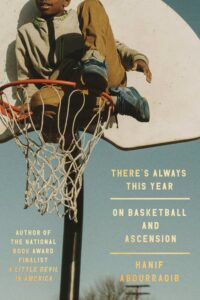Welcome to the latest installment of “Five words from …” our series which highlights interesting words from interesting books!

Hanif Abdurraqib’s 2024 memoir, There’s Always This Year: On Basketball and Ascension, finds him refusing to separate life from its external influences. Structured as a basketball game with quarters, intermissions, and timeouts, Abdurraqib meditates on basketball, belonging, and the art and function of looking back.
“I propose the difference between being naked and being bare is that in a state of nakedness, the end can be seen even if it hasn’t arrived yet. It has less to do with what one is or isn’t wearing, or showing, and more to do with how poorly one keeps the inevitable hidden.”
Abdurraqib opens with an exploration of male baldness as an exercise in self-discovery and self-worth, framed by both the “Fab Five” 1991 recruits for the University of Michigan Men’s Basketball team, and Abdurraqib’s father. The decision to shave one’s head (and the acceptance of genetics) investigates vulnerabilities and self-truths for the mentioned men.
“For all of the reasons I love the hood, the greatest reason is for how we honor our homecomings. The people who will show up to praise your return simply because it is a return. Doesn’t even have to be spectacular, though it often is.”
Abdurraqib remembers his neighbor, high school basketball legend Kenny Gregory, returning from the 1997 McDonald’s All American game, circling the block with his trophies in the front seat before an impromptu parade of neighborhood fans.
“Miracle is another word for deception. Who or what, can make someone believe anything that would otherwise be unbelievable?….A team is losing until it isn’t, until an architect of the miraculous takes over a game and the deception becomes real.”
Abdurraqib recounts his history of inconsistent prayer, both as a reluctant child and desperate adult, and how miracles are often requested in times of great duress. He witnessed what many Ohioans considered a miracle: the path leading to the Cleveland Cavaliers gaining the first pick in the 2003 NBA draft, where they chose LeBron James.
“The people who ignored LeBron’s obvious exit knew they didn’t have any control over what LeBron did or didn’t do, but they were in complete control over when and how their own heartbreak arrived.”
LeBron became a free agent in 2010, forcing locals to process their emotions around their hometown hero leaving. At the same time, Abdurraqib toys with the idea of leaving, as his parole nears completion, for the glimmer of life elsewhere. Here control becomes the basketball court, with awareness and denial being opposing teams.
“Nostalgia is only for the broken-hearted, for the displeased or disaffected, the ones who need to look to the past to give meaning to their present. I’m told there’s nothing in my childhood that will save me from what’s coming, whenever what’s coming arrives…I say I was happier in the past because the pain of the past is a relic. I speak of it, but no longer feel it. I do not know what pain is coming, but I know it is coming.”
Abdurraqib also calls nostalgia “a relentless hustler.” He remembers loved ones and looks ahead to look back on his own death. With clarity and precision, he understands that while nostalgia may honor the death of whole selves and parts of selves, it will never stop the clock from counting down to zero.
Got a book you’d like to see given the “five words from” treatment? Nominate it through this form, or email us!